January 2022 in “Clinical Cases in Dermatology” A 12-year-old boy has a rare, harmless hair loss on his chin with no need for treatment.
 July 2021 in “Indian journal of dermatopathology and diagnostic dermatology”
July 2021 in “Indian journal of dermatopathology and diagnostic dermatology” Trichoscopy is a reliable method for diagnosing hair and scalp disorders quickly and non-invasively.
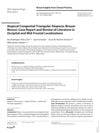 January 2021 in “Skin appendage disorders”
January 2021 in “Skin appendage disorders” The report concludes that atypical Brauer nevus is more common in males, present at birth, and often misdiagnosed due to its unusual scalp locations.
 December 2020 in “Vestnik dermatologii i venerologii”
December 2020 in “Vestnik dermatologii i venerologii” Iron supplements and physiotherapy together can better treat hair loss in women with iron deficiency.
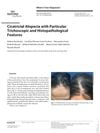 November 2018 in “Skin appendage disorders”
November 2018 in “Skin appendage disorders” The document concludes that a woman has both Frontal Fibrosing Alopecia and Lichen Simplex Chronicus, a previously unreported combination of conditions.
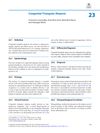 January 2018 in “Springer eBooks”
January 2018 in “Springer eBooks” Congenital triangular alopecia is a harmless, non-spreading hair loss condition often seen in young children.
 April 2016 in “Journal of The American Academy of Dermatology”
April 2016 in “Journal of The American Academy of Dermatology” Different treatments are effective for hair loss conditions, but results vary by individual factors.
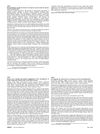 April 2016 in “Journal of The American Academy of Dermatology”
April 2016 in “Journal of The American Academy of Dermatology” Certain scalp tissue features can predict how well alopecia areata responds to steroid injections.
 January 2016 in “Surgical and Cosmetic Dermatology”
January 2016 in “Surgical and Cosmetic Dermatology” Platelet-rich plasma treatment improved hair growth in men with male pattern baldness.
 January 2015 in “Springer eBooks”
January 2015 in “Springer eBooks” The pull test and wash test are cheap, easy methods to diagnose hair loss.
 November 2014 in “British Journal of Dermatology”
November 2014 in “British Journal of Dermatology” Male hair loss is mainly due to thinner hair, not less hair.
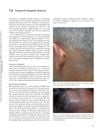 April 2012 in “Informa Healthcare eBooks”
April 2012 in “Informa Healthcare eBooks” Temporal triangular alopecia is a lifelong condition with hairless patches on the side of the head that may be present from birth.
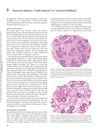 April 2012 in “Informa Healthcare eBooks”
April 2012 in “Informa Healthcare eBooks” Senescent alopecia is a type of hair loss that occurs after age 50, not caused by genetics, and involves a gradual thinning of hair without significant inflammation.
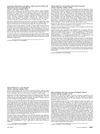 March 2012 in “Journal of The American Academy of Dermatology”
March 2012 in “Journal of The American Academy of Dermatology” Temporal triangular alopecia usually starts in early childhood and treatment with Minoxidil has limited effectiveness.
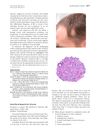
The man has Temporal Triangular Alopecia, a stable, non-scarring hair loss condition best treated with hair transplantation.
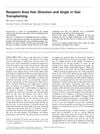 June 2004 in “Dermatologic Surgery”
June 2004 in “Dermatologic Surgery” Dr. Walter P. Unger suggests that copying a person's natural hair direction and angle during transplants leads to a more natural and fuller appearance.
 August 1996 in “Journal of Pediatric and Adolescent Gynecology”
August 1996 in “Journal of Pediatric and Adolescent Gynecology” The document concludes that PCOS in adolescents is complex and requires comprehensive care to manage its symptoms and associated health risks.
 August 2013 in “Pharmacy Today”
August 2013 in “Pharmacy Today” Viviscal may modestly improve hair loss in women without adverse effects.
Dermoscopic features can help distinguish female androgenetic alopecia from telogen effluvium and healthy controls.
 February 2022 in “Chinese Journal of Dermatology”
February 2022 in “Chinese Journal of Dermatology” A 36-year-old woman with worsening hair loss over 10 years was treated with various medications, and after six months, her hair loss did not worsen significantly.
 October 2021 in “West African journal of medicine”
October 2021 in “West African journal of medicine” Hair loss in women in Lagos, Nigeria is rare but severe when it occurs, with symptoms similar to those seen worldwide.

Hair loss in women in Lagos, Nigeria is not common, but when it happens, it's usually severe.
January 2020 in “International Journal of Trichology” PRP injections are not effective for long-term treatment of temporal triangular alopecia.

Androgenetic alopecia (AGA) is a common, hereditary hair loss condition that can be slowed but not permanently reversed with available therapies.
January 2018 in “International Journal of Medical Reviews and Case Reports” Bimatoprost 0.03% solution may help treat hair loss.
 September 2010 in “Advances in Dermatology and Allergology/Postępy Dermatologii i Alergologii”
September 2010 in “Advances in Dermatology and Allergology/Postępy Dermatologii i Alergologii” TrichoScan is reliable for counting and measuring hair density but may not accurately assess hair types in women with hair loss.
 February 2009 in “Journal of The American Academy of Dermatology”
February 2009 in “Journal of The American Academy of Dermatology” Female hair loss can be diagnosed using specific trichoscopy criteria.
 January 2007 in “Revista del Centro Dermatológico Pascua”
January 2007 in “Revista del Centro Dermatológico Pascua” Hair loss in women, often not related to male hormones, increases with age and can cause significant emotional distress.
 196 citations,
June 2008 in “International Journal of Dermatology”
196 citations,
June 2008 in “International Journal of Dermatology” Dermoscopy helps diagnose and manage alopecia areata by showing specific hair changes.
 89 citations,
March 2018 in “The Journal of Dermatology”
89 citations,
March 2018 in “The Journal of Dermatology” Trichoscopy helps diagnose and monitor alopecia areata by looking at a combination of specific hair and scalp features.

























